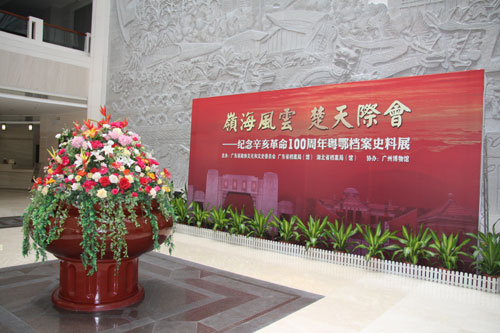Impact of Guangdong and Hubei on Xinhai Revolution
 0 Comment(s)
0 Comment(s) Print
Print E-mail
CRI, September 21, 2011
E-mail
CRI, September 21, 2011
While the Xinhai Revolution, or 1911 Revolution, took place in south China's Guangdong Province, the revolt actually got its start in Hubei Province, a researcher at Guangdong Archives Bureau said on Tuesday.
 |
|
This photo taken on September 20, 2011, shows part of an archival exhibition about the Xinhai Revolution, or 1911 Revolution, in Guangzhou, south China's Guangdong Province. |
Zhao Xiulei made the remarks during an archival exhibition to mark the centenary of the Xinhai Revolution in Guangzhou, capital of Guangdong Province.
According to Zhao, in the middle of the 19th century, the Opium War compelled Guangdong Province to rebel against foreign invaders. Because of its special natural and cultural environment, Guangdong became China's first province to become acquainted with western culture. Guangdong absorbed capitalism and became the most important source of China's modern revolution.
Sun Yat-sen from Guangdong's Xiangshan called on patriots to take action to rescue the endangered Chinese and build a strong motherland. Although Sun led 10 armed uprisings from 1895 to 1911, they all failed.
Meanwhile in Hubei, the bourgeois democratic revolution made considerable progress. On October 10, 1911, the famous Rise of Wuchang took place in the provincial capital, and insurgents conquered Wuchang city one night later. Afterwards, many provinces claimed their independence from the Qing Dynasty, bringing about the fall of China's last imperial dynasty.
When asked why the Rise of Wuchang was such a success, Zhao said many factors led to it. After the Treaty of Tianjin in 1858, western countries including Britain, Germany, France, Japan and United States invaded Hubei, and the province's natural economic structure gradually disappeared. While many peasants and handicraftsmen lost their jobs, Hubei made advancements in modern enterprise, education and the military.
Zhao also noted two other reasons for Hubei's successful democratic revolution. First, local leader Duan Fang led part of the army to put down the uprising in southwest China's Sichuan Province, so that its defensive strength was weakened. Second, Qing Dynasty officials hunted revolutionary party members in Wuchang after a failed bomb attempt, and soldiers associated with the revolution feared being arrested.





